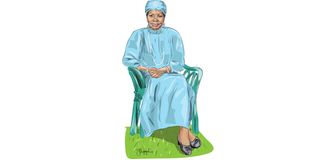Seven years later: Remembering Grace Ogot, prolific Kenyan writer

A portrait of Grace Ogot.
What you need to know:
- Grace attended Ng'iya Girls' School and Butere High School
- Her first novel, The Promised Land, was published in 1966.
This weekend marks the seventh anniversary of the death, on March 18, 2015, of one of Kenya's most renowned authors, Grace Ogot. Born Grace Emily Akinyi, on May 15, 1930, in Asembo, Siaya County, she was variously a nurse, journalist, politician and diplomat. The daughter of a devoutly Christian family, with a teacher father, Grace attended Ng'iya Girls' School and Butere High School, before training as a nurse in both Uganda and the United Kingdom.
On the literary front, she was, alongside Charity Waciuma, author of the autobiographical novel Daughter Of Mumbi (1969), among the first Anglophone female (Kenyan) writers to be published. She wrote under the inspiration of her father, Joseph Nyanduga (an early convert to the Anglican Church, and one of the first men in Asembo to receive a Western education), who read Bible stories to a younger Grace, and her grandmother, who told her stories whose thematic concern was, mostly, Luo tradition.
Grace, who also worked as a script-writer and broadcaster for the BBC Overseas Service, later hosting her own weekly radio program in Dholuo, began publishing short stories both in English and Dholuo in the early 1960s, and her first novel, The Promised Land, was published in 1966. It explored and depicted the challenges faced by the pioneer Luo settlers in Eastern Africa, who flitted around the region in search of opportunity.
Land Without Thunder, a collection of short stories about traditional life in rural Western Kenya, was published in 1968. She followed these up with two other short story anthologies, The Other Woman and Other Stories (1976) and The Island Of Tears (1980), as well as a second novel, The Graduate (1980). This particular novel was a tale of the myriad tribulations and misfortunes faced and endured by a young Kenyan graduate who returns home from studies abroad (the United States), including unemployment, crime, corruption and exorbitant family expectations.
She also churned out a series of historical novels, whose thematic focus was the migration into East Africa of, and activity involving, the Luo People. Several of her works have been dramatised and performed at theatre in Kenya.
Female literary giants
In recognition of her immense contribution to the region's literary scene, she was named a delegate to the General Assembly of the United Nations in 1975, later serving as a member of the Kenyan delegation to UNESCO in 1976. Having helped found the Writers' Association of Kenya, she served as its chair from 1975 to 1980, before former President Daniel arap Moi appointed her to the National Assembly in 1985, subsequently making her the Assistant Minister for Culture.
In 1988, she was elected to Parliament, to represent her husband's (the historian and scholar Bethwell Alan Ogot, whom she married in 1959) home constituency of Gem, also in Siaya, and was re-appointed to the Culture docket, as Assistant Minister, until 1993. Her husband Bethwell, who is still alive, is himself a renowned history scholar and enthusiast, and a prolific author whose literary output is mostly a paean to the various cities and towns in Kenya and a number of higher learning institutions in East Africa.
The seventh anniversary of her death comes hot on the heels of the week the world has been marking the International Women's Day, and at a time when the East African region and the continent of Africa in general are witnessing the emergence of more female writers, eager and minded to claim their (equal) share of space on the global literary stage.
Beyond the region's female literary giants of yesteryears, such as Micere Mugo, Margaret Ogola, Charity Waciuma and, of course, Grace Ogot, Africa is registering a superfluity of literary talent, featuring young female writers, such as Chimamanda Ngozi Adichie of Nigeria, Kenya's Yvonne Adhiambo Owuor, Makena Onjerika, Kingwa Kamencu and Cynthia Abdallah, Uganda's Stellah Nyanzi and Jennifer Nansubuga Makumbi and NoViolet Bulawayo of Zimbabwe, whose works only add to the increasingly assertive women's voice in society.
The late Grace Ogot's literary oeuvre, which also includes The Strange Bride (1989), The Other Woman (1976), Miaha (1980), The Royal Bead, Simbi Nyaima and Princess Nyilaak (the latter three published posthumously), not only earned her regional acclaim, but also made her the subject of global literary research and study. Oladele Taiwo devoted a whole chapter in her Female Novelists Of Modern Africa (1984) to Grace Ogot's literary development; Bernth Lindfors has published 'An Interview With Grace Ogot' in World Literature Written In English (1979); and O. R. Dathorne included a chapter on Grace Ogot in 'Role Of The Black Woman' in African Literature In The Twentieth Century (1974).
Grace Ogot was also one of 570 women writers of the 20th Century chosen to appear in Modern Women Writers, a four-volume set encompassing literary review, biographical material and excerpts from published works, released in 1996.
Mr Baraza is a votary of global peace, historian, writer, thinker and founder Public Affairs Volunteers for Global Peace and Climate Justice (PAVGPCJ). [email protected]





